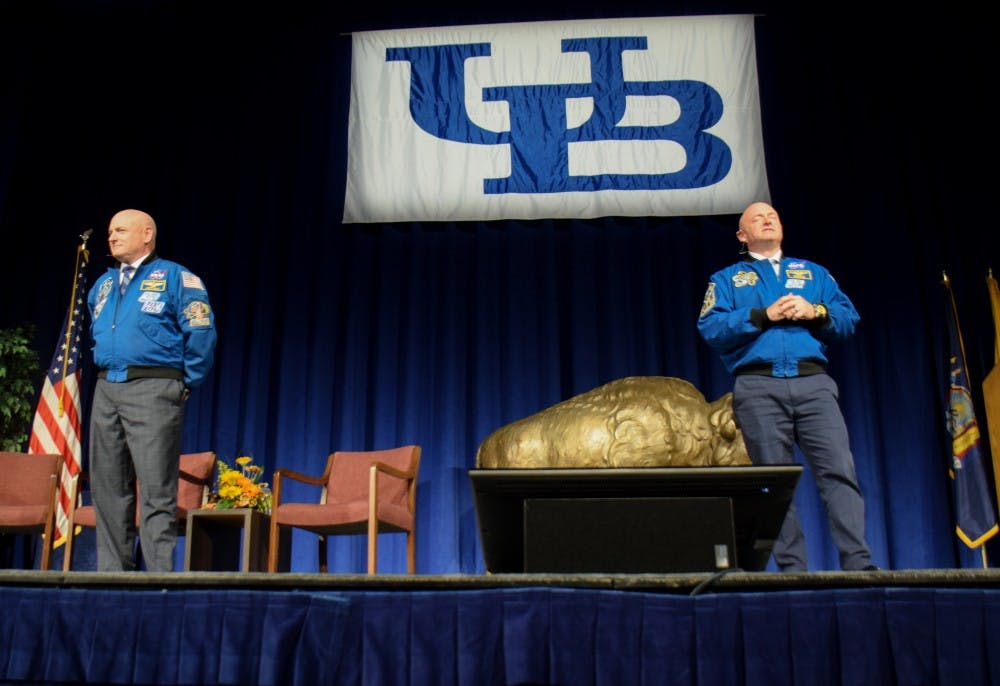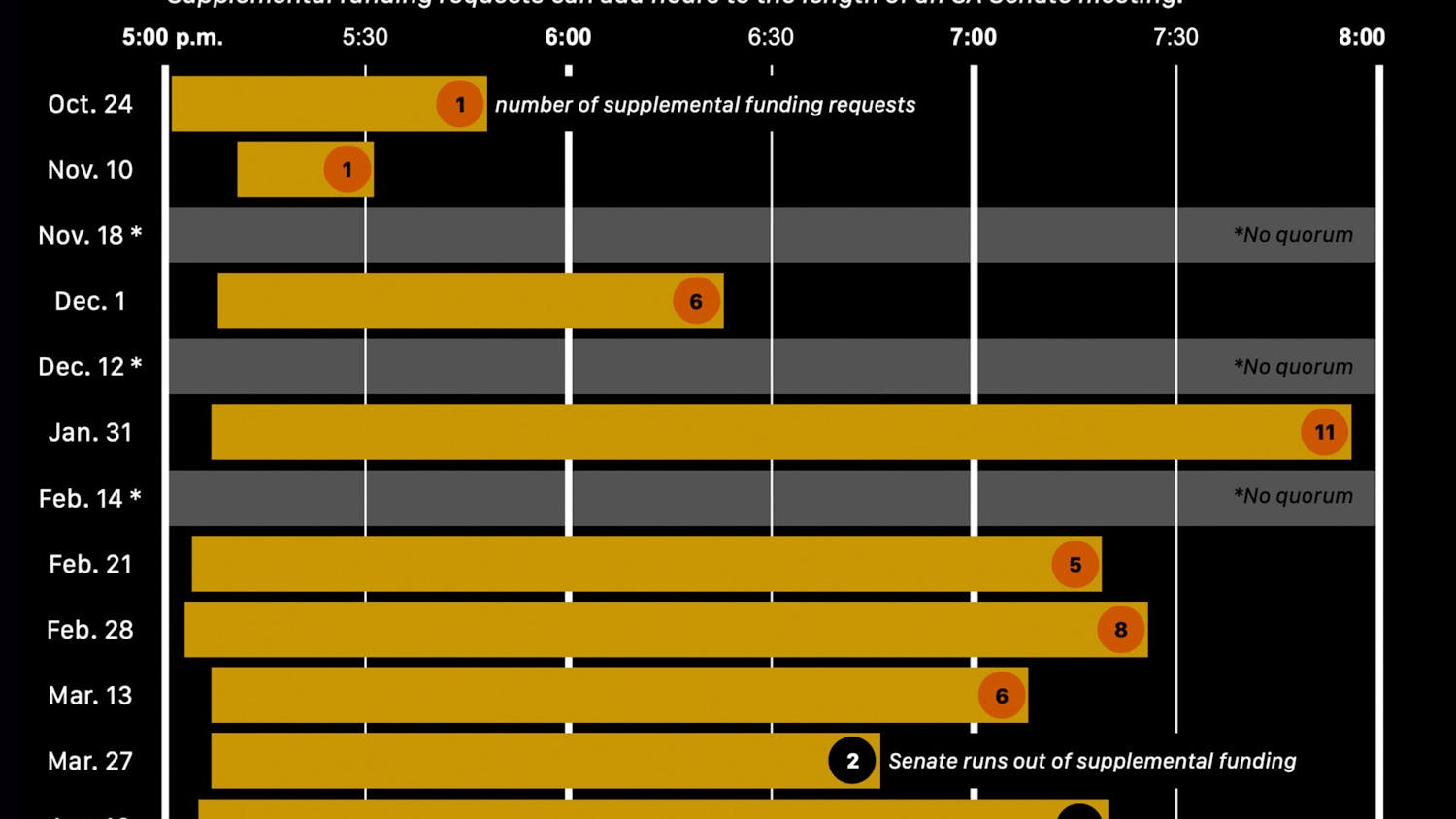Mark Kelly and his brother Scott Kelly went into one of the greatest personal and professional challenges of their lives. Mark had flown 39 combat missions in the U.S. navy when his wife, Congresswoman Gabrielle Giffords, was shot. Scott had experienced a Russian satellite traveling 17,500 miles an hour dangerously fly by his space station.
But it was nothing they couldn’t handle. If there’s one thing the Kelly brothers are capable of, it’s endurance.
The Kelly brothers began the Distinguished Speaker Series in Alumni Arena Thursday evening with stories. They were two unmotivated Irish kids from New Jersey who applied to the wrong college by mistake. They would eventually become captains in the U.S. Navy and go into space a combined total of eight times.
The Kelly brothers urged students to take risks, work “really hard” and never settle for the status quo. Most importantly, the Kelly brothers shared a message about control – knowing when you have it and accepting when you don’t.
For Scott, who just returned in March 2016 from a year-long orbit in space, the physical and mental challenge of becoming an astronaut is what made the risk and the pain worth it.
Mark also spoke about the role astronauts play in physiological experiments, such as the “Twin Study” he and Scott participated in. Given their identical DNA, NASA scientists studied the physiological effects of space by comparing Mark and Scott.
They joked around a lot, with each other and at the Buffalo Bill’s expense.
“What many people don’t know is that the twins they originally wanted were Rex and Rob Ryan – but from what we heard, they were too busy ruining your football team,” Mark joked to a thunderous applause.
Mark said his brother could age dramatically in the next ten years. Scott might someday experience partial or even full blindness. The long-term effects of the radiation he received in space aren’t known fully, Mark said.
Scott shrugged this possibility off, saying, if he looks older than Mark in ten years, it’s because his brother got botox. Still, Scott acknowledged that going into space is a high-risk venture.
But their message was clear and earnest.
Scott spoke about the day he was most afraid in space when a Russian satellite traveling 17,500 miles an hour came dangerously close to their space station. After being told control was unable to move the space station in time, Scott was completely powerless.
Only when he saw his Russian co-astronauts casually eating lunch while he panicked, Scott said he remembered the importance of focusing only on what you can control.
Mark Kelly told a similar story about his first combat mission, the opening night of Operation Desert Storm. He said it was the “worst feeling he ever had” when he saw not one, but two missiles tracking his plane.
Mark said he learned to worry only about what was in his power by watching his partner. He completely “compartmentalized” his focus on what was in his control, despite the intense pressure and fear of attack.
Scott reiterated the importance of relinquishing control when he learned his sister-in-law had been shot. He would not reach Earth for two more months.
“I tried to support my brother Mark here as well as I could, I took some time off, but eventually I realized that there was really nothing that I could do to help the situation on Earth. I really needed to focus on what I could control on the space station,” said Scott.
In an interview with The Spectrum, Mark and Scott Kelly described what they called, “an orbital perspective,” and how it motivated them to want to “do better” on Earth.
“When I was in space last summer, summer 2015 now, every time I would fly over the Mediterranean, I would think about those refugees down there, those boats down there, the little kids dying. You look down and it looks very peaceful but it really isn’t. Also you don’t see any political borders between countries so it makes it look like we’re all kind of in this together,” Scott said.
After their discussion, the Kelly brothers took questions from several students, including a Russian student from St. Francis High School, who exchanged a few words with Scott in his native language.
Heeba Kariapper, a sophomore computer science major, said she was inspired by the Kelly’s talk to explore her own “version of space.”
“It made me want to go to more of these speaker events,” Kariapper said. “My favorite part was when they were talking about the beauty in space, that’s definitely something I’ve always thought about, like what it would be like to see from that perspective. Most people don’t get to see that so to hear it from them was cool.”
Sam Trzaska, a junior history and political science major, said he liked the back-and-forth between the bothers.
“You could tell they were twins,” Trzaska said.
Trzaska said although he couldn’t share their experience, he could imagine how they felt about the planet after seeing it from space.
“I thought that their point about children in polluted areas never seeing a blue sky was really insightful,” said Trzaska
The next guest in the Distinguished Speaker Series will be Randi Zuckerberg, founder and CEO of Zuckerberg Media. Zuckerberg will speak on Oct. 26 at 8 p.m. in Alumni Arena.
Sarah Crowley is the assistant news editor and can be reached at sarah.crowley@ubspectrum.com





